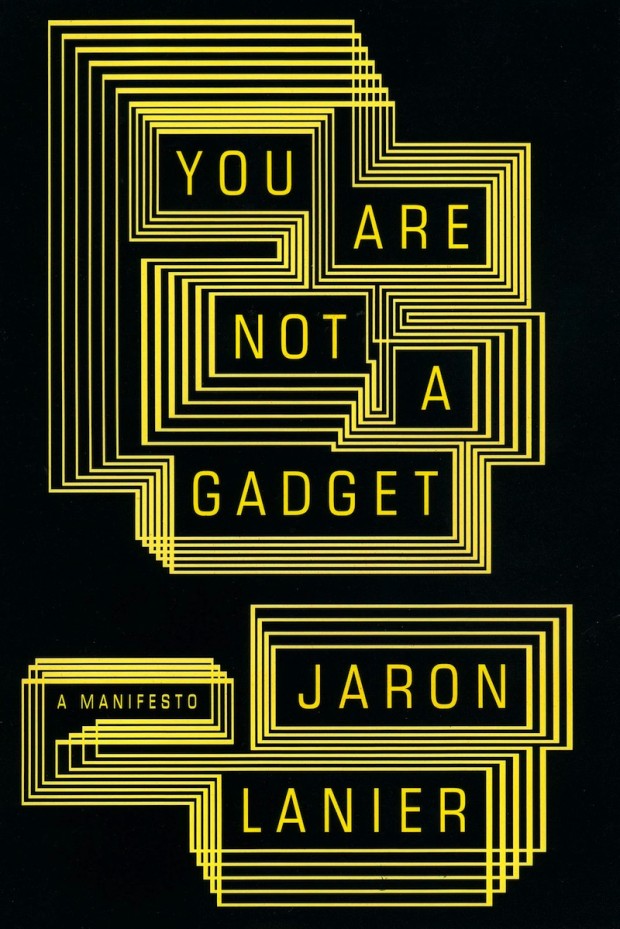An iconographic and text archive related to communication, technology and art.
Evgeny Morozov and Malcolm Gladwell are the two most visible skeptics of the utopian claims made for “Liberation through Facebook.” Their arguments seem sensible to me, though I think they lose sight of the distinction between the architecture of the Internet, which is the fundamental value brought to people by services like Facebook and Twitter, and the shallower qualities unique to those services. My impression of what has gone on in the Middle East is that the fundamental character of the Internet- connecting anyone to anyone, asynchronously, on demand, with persistent data sharing – is genuinely helpful to people on the ground.
☛ Jaron Lanier: You Are Not a Gadget‘s Frequently Asked Questions
He goes on:
The particular designs of today’s top social networking sites might come back to haunt emerging democracies as they try to bring societies together while the connecting software is trying to regiment people into corrals for ideal advertising targeting.
For the moment, I am super delighted that digital technologies are symbols of youth and freedom, and the potential for a better future. I also note that ordinary people in the Middle East are trusting American services in difficult times, and that is a hopeful sign in a world that sometimes seems to be locked in hopeless “civilization clash.”
On the other hand, the intense American focus on the roles of the fashionable brands – Twitter and Facebook – amounts to an orgy of narcissism that once again makes the story be about us. It turns into yet another way to not listen openly to what someone in Egypt might be saying. Let’s make sure to make it a two-way exchange.
About Jaron Lanier:
Lanier’s name is also often associated with Virtual Reality research. He either coined or popularized the term ‘Virtual Reality’ and in the early 1980s founded VPL Research, the first company to sell VR products. In the late 1980s he led the team that developed the first implementations of multi-person virtual worlds using head mounted displays, for both local and wide area networks, as well as the first “avatars”, or representations of users within such systems. While at VPL, he and his colleagues developed the first implementations of virtual reality applications in surgical simulation, vehicle interior prototyping, virtual sets for television production, and assorted other areas. He led the team that developed the first widely used software platform architecture for immersive virtual reality applications. Sun Microsystems acquired VPL’s seminal portfolio of patents related to Virtual Reality and networked 3D graphics in 1999. (Jaron Lanier’s Bio)
[UPDATE – July 14, 2011] The New Yorker just published a profile of Jaron Lanier: “The Visionary. A digital pioneer questions what technology has wrought” (subscription is required) by Jennifer Kahn, July 11, 2011, pp. 46-53
His official website is a rich repository of resources about him and his work. Here’s the page about his latest book You Are Not a Gadget (Knopf, 2010). It offers multiple FAQs, related material and blurbs about the book. The following review was retrieved from Amazon.com:
For the most part, Web 2.0–Internet technologies that encourage interactivity, customization, and participation–is hailed as an emerging Golden Age of information sharing and collaborative achievement, the strength of democratized wisdom. Jaron Lanier isn’t buying it. In You Are Not a Gadget, the longtime tech guru/visionary/dreadlocked genius (and progenitor of virtual reality) argues the opposite: that unfettered–and anonymous–ability to comment results in cynical mob behavior, the shouting-down of reasoned argument, and the devaluation of individual accomplishment. Lanier traces the roots of today’s Web 2.0 philosophies and architectures (e.g. he posits that Web anonymity is the result of ’60s paranoia), persuasively documents their shortcomings, and provides alternate paths to “locked-in” paradigms. Though its strongly-stated opinions run against the bias of popular assumptions, You Are Not a Gadget is a manifesto, not a screed; Lanier seeks a useful, respectful dialogue about how we can shape technology to fit culture’s needs, rather than the way technology currently shapes us.
- By Philippe Theophanidis
- on
- ― Published in Communication, Technology
- Tagged: book, Facebook, gadget, identity, Internet, Jaron Lanier, révolution, Twitter, user, Wikipedia

